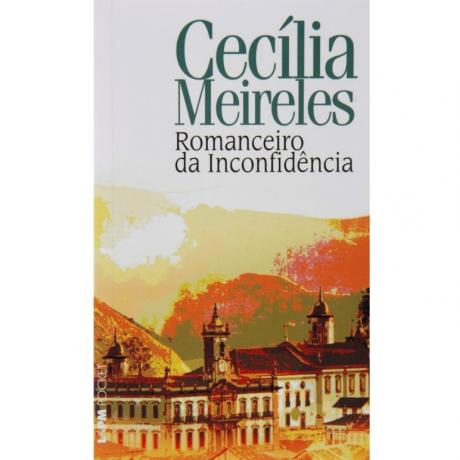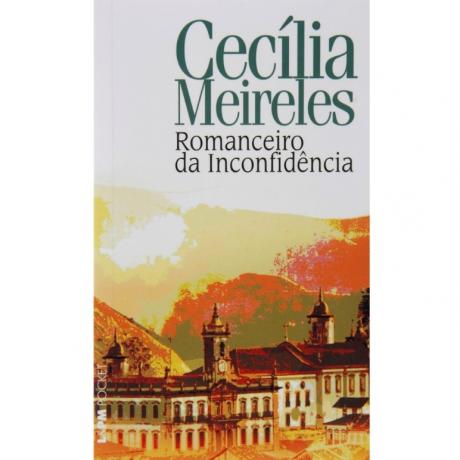Cecília Meireles, Brazilian poetess, born on November 7, 1901, In Rio de Janeiro city. Orphaned by her father and mother, she was raised by her maternal grandmother. In 1917, she began working as a primary school teacher. From 1936 to 1938, she was a professor at the University of the Federal District. From the Brazilian Academy of Letters, he received the Olavo Bilac Award, in 1938, and the Machado de Assis Award, posthumously, in 1965.
Thus, the author of Inconfidence Romance, deceased on November 9, 1964, was part of second generation of Brazilian modernism, with books marked by melancholy, sensoriality and reflection on the contemporary world, works that work on themes such as love, loneliness, time, eternity, nostalgia, suffering, religion and death.
Read too: Francisca Júlia — poetess of Brazilian Parnassianism
Biography
Cecília Meireles was born in November 7, 1901, in Rio de Janeiro. She did not know her father, who died before his daughter was born. Furthermore, was orphaned of mother when she was two years old. Thus,
was raised by maternal grandmother. In 1917, she graduated from the Normal School of the Institute of Education of Rio de Janeiro, when she started the magisterium like Primary teacher, in addition to studying singing and violin at the National Conservatory of Music.
Your first book — spectra — was written when the poetess had 16 yearsdeity and published in 1919. Three years later, she married the plastic artist Fernando Correia Dias (1892-1935), with whom she had three daughters. However, the couple ended up going through many financial difficulties. So, in addition to her work as a teacher, the writer wrote articles about education to News Diary, from 1930 to 1933.
The author's approach to the modernist movement occurred in 1927, through the Catholic and neo-Symbolist magazine Party. In 1934, Cecília created the first children's library of the country, in Rio de Janeiro. That year, she traveled with her husband to Portugal to give lectures at universities. The following year, as a result of depression, her husband committed suicide. From there, the financial difficulties increased. From 1936 to 1938, the writer worked as a professor of Luso-Brazilian Literature and also of Literary Technique and Criticism at Federal District University.
Do not stop now... There's more after the advertising ;)
In 1940, the poetess married the doctor Heitor Grilo, the year the couple traveled to the U.S, where Cecília Meireles taught a course in Brazilian Literature and Culture at the University of Texas, in Austin. Then she attended literature conferences, folklore and education in Mexico. The following year, in addition to writing for Tomorrow, directed the magazine Travel in Brazil, from the Press and Propaganda Department (DIP). Later, in 1944, she wrote to Folha Carioca it's the Correio Paulistano.
The writer retired as a school principal in 1951. Two years later, she was invited by Nehru (1889-1964), the Prime Minister of India, to join a symposium about the work of Gandhi (1869-1948). That same year, Cecília Meireles also wrote for The State of S. Paul. As early as 1958, she was invited to participate in conferences in Israel. In 1961, he wrote chronicles for the program Quadrant, from Radio Ministry of Education and Culture, and also for the program voices from the city, from Rádio Roquette-Pinto, in 1963, a year before he died, in November 9, 1964.
The writer Cecília Meireles received the following awards and tributes:
Gold Medal (1913) — from the hands of olavo bilac (1865-1918), poet and school inspector of the Federal District, for completing, with distinction, the high school course at Escola Estácio de Sá;
Olavo Bilac Award, from the Brazilian Academy of Letters (1938);
Degree of Officer of the Order of Merit (1952) — Chile;
PhD title honoris causa from the University of Delhi (1954) — India;
Machado de Assis Award, from the Brazilian Academy of Letters (1965) — posthumous.
Read too: Cora Coraline— Goiás poetess who conquered literary criticism
literary features
Cecília Meireles is a poetess of second phase of mmodernism Brazilian. Her works, therefore, feature the following features:
existential crisis;
spiritual conflict;
sociopolitical theme;
reflection on the contemporary world;
rescue of classical poetry;
formal freedom, with the use of verses:
regular: with metric and rime;
white: with meter and without rhyme; and
free: no rhyme and no meter.
Also, it is recurrent in the author's works the melancholy, the escape in the dream, the use of synesthesia, the awareness of the ephemerality of life, the fleetingness of time, in addition to thematic like love, loneliness, time, eternity, longing, suffering, religion and death.
Construction

spectra (1919)
child my love (1923)
Never (1923)
Poem of poems (1923)
ballads for the king (1925)
the victorious spirit (1929)
greeting to the girl from Portugal (1930)
Batuque, samba and macumba (1933)
the party of letters (1937)
Travel (1939)
little cat eyes (1940)
vacancy music (1942)
absolute sea (1945)
Ruth and Albert (1945)
Rui: short story of a great life (1948)
natural portrait (1949)
Children's Literature Problems (1950)
love in Leonoreta (1952)
Twelve Nights from Holland and the aeronaut (1952)
Inconfidence Romance (1953)
Poems written in India (1953)
Santa Clara Small Oratory (1955)
Pistoia, Brazilian military cemetery (1955)
Azores folkloric panorama (1955)
songs (1956)
Girofle, gyrofla (1956).
Romance of Saint Cecilia (1957).
The Rose (1957).
Metal Rosicler (1960)
Israel Poems (1963)
Sunshade (1963)
either this or that (1964)
choose your dream (1964)
Trovada Chronicle of the City of Sam Sebastiam (1965)
the late boy (1966)
italian poems (1968)
flower of poems (1972)
Elegies (1974)
flowers and songs (1979)
Inconfidence Romance is considered the main work of the author and configures itself in a long narrative and historical poem, because it speaks of Mining Inconfidence and its characters, in addition to showing previous facts and characters. The poem is divided into 85 novels, written in regular verses, that is, with metrification and rhymes.
In “Romance VII or Do negro nas catas,” for example, with verses in bigger round (seven poetic syllables), the storyteller talk about the life of the black slave in Minas Gerais.
You can already hear the black,
but the day is still far away.
It will be by the morning star,
with your rays of joy?
will be for some Diamond
on fire, in the dawn so cold?
[...]
You can already hear the black man singing.
where will they meet
these starless stars
freeing from slavery,
stones that, better than men,
bring light to the heart?
You can already hear the black man singing.
Cry fog, the dawn.
small stone not worth:
freedom it's a big stone...
(The whole earth was shaken,
the water all overturned...
God in heaven, how is it possible
regret so much and have nothing!)
In “Romance XIV ou Da Chica da Silva”, with verses in small round (five poetic syllables), the narrator presents Chica da Silva (1732-1796) — a historical character from Diamantina (Minas Gerais) —, a former slave with unusual economic power for black people at the time.
what floor
on that porch?
It's Chica da Silva:
It's Chica-que-rules!
face color of the night,
star-colored eyes.
people come from far away
to meet her.
[...]
slaves, butlers
follow, like a river,
the owner's owner
of the Serro do Frio.
[...]
Contemplate, little whites,
on her porch,
to Chica da Silva,
the Chica-que-rules!
(Something like that has never been seen.
Dom João Quinto, famous king,
there was no woman like that!)
And, finally, in "Romance LX or From the way to the gallows", with verses in bigger round, the narrator shows the hero Tiradentes (1746-1792) on his way to his death sentence:
The military, the clergy,
the bailiffs, the nobles
who knew him from the streets,
of churches and theater,
from the merchants' stores
and even from the Paço room;
and the ladies plus the maidens
who had never looked at him,
the boys and the gypsies,
the mulattoes and the slaves,
the surgeons and algebraists,
lepers and bloody ones,
and those who were sick
and that he had healed
— now they are seeing from afar,
from afar listening to the step
of the ensign who is going to hang,
carrying the tether to the chest,
leading in thought
faces, words and facts:
at promises, at lies,
vile languages, false friends,
colonels, smugglers,
hermits and potentates,
inns, voices, shadows,
goodbyes, rivers, horses...
[...]
See too: Sagarana — analysis of Guimarães Rosa's debut book
poems
Next, we are going to read two poems by Cecília Meireles. The first is "Portrait", from the book Travel. In that poem, the lyrical self makes a self portrait, in which he demonstrates the changes he underwent over time, as his face became “calm”, “sad” and “thin”, his eyes became “empty” and his smile or voice bitter. Furthermore, his hands no longer have the strength, and the lyrical self represses its own feelings:
I didn't have this today's face,
thus calm, thus sad, thus skinny,
neither these eyes so empty,
nor the bitter lip.
I didn't have these hands without strength,
so still and cold and dead;
I didn't have this heart
that doesn't even show.
I didn't notice this change,
so simple, so certain, so easy:
— In which mirror was it lost
my face?
Already in the poem "Order", from the book vacancy music, O me lyric demonstrate your wish to eternalize a moment. To do this, he orders a photograph, in which he is laughing, wearing a party dress, and his face is lit up and with an "air of wisdom". In the company of the poetic self, an empty chair will be immortalized, which may suggest the absence of someone:
I wish one photography
like this — do you see? - how are you doing:
on what forever laugh me
ordinary eternal party dress.
As I have a dark forehead,
shed light on my forehead.
Leave this wrinkle, which you lend me
a certain air of wisdom.
Do not fund forest
nor arbitrary fantasy...
No... In this space that remains,
put one empty chair.
See too: Maria Firmina dos Reis – writer of Brazilian romanticism
Sentences
Let's read, below, some sentences by the poet Cecília Meireles, taken from an interview given to Peter Bloch (1914-2004), in 1964:
"My addiction is to like people."
"I have such a deep love for the human creature that it must be a disease."
"Looking back I feel like an extremely poetic child."
"I'm very afraid of literature that is just literature and doesn't try to communicate."
"I'm constantly hungry to get it right."
"Culture, for me, is always new emotion."
“Poetry can even be created on a tram ride.”
"In inventing, there is a certain amount of vanity."
"What fascinates me is the word I discover."
"I think every human being is sacred."
"I'm a friend even to the dead."
"I'm sorry to see a word that dies."
"Travel is stretching the human horizon."
“I don't study languages to speak, but to better penetrate the souls of peoples.”
"The passage from the magical world to the logical world enchants me."
"I'm very sorry for the poems I don't write."
Image credits
|1| Public domain / National Archives Collection
|2|L&PM Publisher / Reproduction
by Warley Souza
Teacher of

